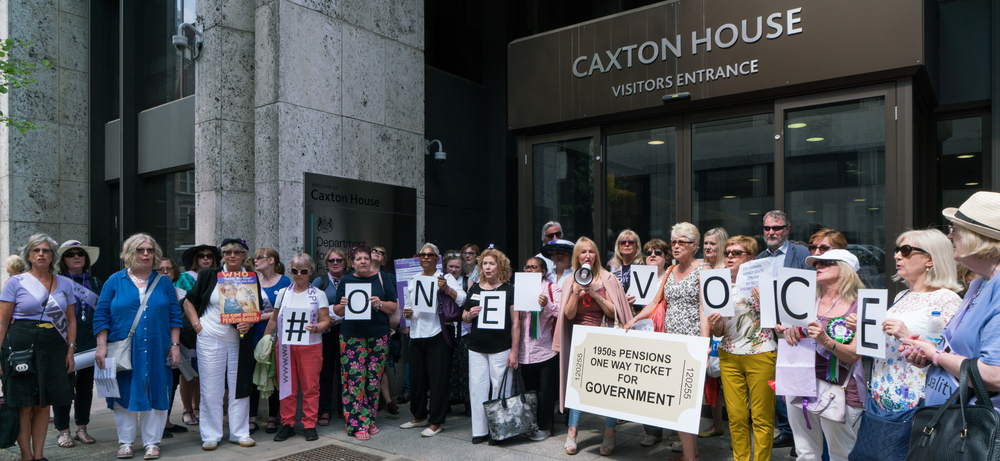This post is inspired by an article which was published on the iNews.co.uk website this week. The website were doing a series of posts about women in their 60s and their experiences of returning to work, staying in the workforce, accessing education, retiring and facing difficulties of their age.
The article focused around the story of 64 year old Irene Anderson-Keys, a woman who lost her beloved husband and best friend Philip in 2017 to cancer. Since losing her husband who she had enjoyed 20 wonderful years of marriage, her life has been one long stressful struggle… mostly thanks to the recent change in the state pension hand out.
Philip was diagnosed with cancer in March 2015. Irene cared for Philip until he passed in 2017. Irene is one of the women who were born in the 1950s affected by the state pension changes where the UK Government raised the age women received their state pension in line with the men.
Called State Pension Age Equalisation, women born after a specific date now received their state pension at the age of 65 soon to be 66. This is fine in principle, but for women who were working towards a retirement age of 60, they were forced to either work longer or self fund 5 years of retirement.
Many women were unaware of the planned changes and had been unable to prepare financially.
Irene worked as a dog groomer but gave up work to care for her husband who had been the main breadwinner, working as a singer and musician. When Philip died Irene was not working and unable to pay the mortgage. Not yet being at the ‘new’ state pension age of 65, Irene did not receive her pension and was forced to sell her home, the home she had shared with Philip for the last 20 years.
She is currently living in rented accommodation in Dorset and receiving Universal Credit. Due to having dogs, Irene could not find a landlord who would accommodate and was forced to rent a ‘lodge’ which she described as ‘like a caravan’.
“I’ve been through two huge losses – my house and my home – and my life has been turned upside down,” Irene says. “Had I received my state pension at 60, I would have been able to afford to carry on paying my mortgage,”
“I’m 65 this month and I don’t get it until I’m 66. All this has had a traumatic effect on me and I now feel very depressed and anxious and have lost my confidence. I feel very insecure in a rented lodge.”
As well as losing the love of her life slowly from a devastating illness and then being forced to sell her home, Irene worried about becoming homeless because the money which was leftover from the sale of her home after debts had been paid off has almost been spent on rent.
Irene has one year to go before she can receive her state pension of around £168.60 per week giving her some peace of mind. Where state pension is unconditional, benefits like Universal Credit are conditional. Irene could lose the benefits in a moment’s notice if she fails to meet those conditions.
“I’ve been suicidal, because I just don’t know where to go from here. I’ve almost run out of money, I had quite a big mortgage on the house which is why I’m renting. When I’m 65 in March I have another year to go until I get my state pension.”
“All I’ve been able to do since moving to this part of the world is caring and dog-minding. There is not a lot of work, and as you get older there is even less.”
There are caregiver jobs available in the area but Irene’s doctor has told her that she is not suitable for such physically demanding work these days. Caring is a physically demanding job.
“I am nearly 65 and I do have arthritis.” Irene is also on prescribed medication for an underactive thyroid and depression.
“I’ve been assessed as limited capability for work because of depression,” she explains. “When I have bad days I can sit indoors and stare into space. I won’t even look at the telly and before I know it, it is 3pm, and I’m wasting my life away.”
Irene knows that soon she may have to give up her beloved dogs, the prospect of which she finds devastating. “They are my company, they get me out in the air by taking them for a walk.”
Irene wasn’t aware of the changes being made to the state pension. Being preoccupied with caring for her dying husband she didn’t give it much thought. She turned 60 around the time he was diagnosed.
As with many women who were born in the 1950s who were going to be affected, Irene was not notified by the Government informing of the new changes. The Government – as they will do and always have – says that the changes were ‘clearly communicated’.
The changes are causing a lot of hardship and stress for these women. There are 1.34 million women in their 60s working in Britain today, an increase of 54% since 2009. According to the website Rest Lest, a website dedicated to jobs and volunteering for the over 50s, there are 550,000 women aged 65 and over who are working which is up 48% since 2009.
More and more women in their 60s are being forced to find work, but many of them admit to struggle to actually find work. People and companies are not taking them on leaving many of them having to live on state benefits. In 2019, more than 75% of women in their 50s were employed but for women in their 60s, that figure was 37%.
So the point of this article is… No one should rely on their state pension or the Government. As we have seen, Governments change as do policies and society on a whole.
We simply cannot rest on our laurels and think that what we have paid in will come back to us and look after us. It simply isn’t true, not for everyone at least. People were left struggling when Gordon Brown pilfered people’s pension funds back in 1997 and women are struggling today thanks to the latest changes to the state pension date.
The story of Irene Anderson-Keys is enough of a warning. When one person who has worked and paid taxes into a system and is expecting to retire and receive their pension at 60 is left with no pension for 6 years, is forced to sell her marital home and find work… then that is all the warning a person needs to realise that their future is in their hands.
As we know, people are living longer with better health today. But that doesn’t mean that they can still do 40 hours on a building site, running up and down scaffolding or working in mentally and physically demanding jobs like they once did without batting an eyelid.
As people get older, they slow down. Their bodies slow down and they choose to slow down. Who wants to rush around like a blue arsed fly when they don’t need to anymore?
They cannot run around like they used to… and why should they?
It is in everyone’s interest to find a way to generate an extra income each month and supplement their pension. One which will at least cover living costs. Something passive or semi-passive is better but failing that, if a person needs to work to earn the extra monthly income then it shouldn’t be too taxing on the mind and body.
Depending on what age you are at time of reading this article, you can start investing. There are many things which you can invest in from stocks and shares to peer to peer lending companies.
Make Up to 11.2% Return On Your Savings With Kuflink Peer To Peer Lending
Leveraging the money you have wisely can pay off big dividends. At least you can earn more than if you left your money sitting in a bank account gathering dust.
You might want to consider developing a freedom skill which allows you to make money anywhere at any time with little equipment. Writing is a freedom skill as you can do it using only a smartphone and can be done just about anywhere in the world.
Choose a premium freedom skill which allows you to charge a premium for a service like becoming a counsellor or a hypno-therapist.
Maybe learn a set of skills which can earn you money by teaching them to others.

Maybe not ideal for a person pushing 60 or 70 but there are people making money teaching English online to children and adults around the world.
Spend some time thinking about what it is that you would like to do, can do or think you need to learn in order to earn an income to supplement your retirement. Unless you want to really go hands on and start and grow a business like these people The Economic & Entrepreneurial Prosperity Of The UK’s Growing Ageing Population.
We suggest finding something which pays well for doing very little in the way of hard physical and mental work. There are jobs out there which pay well for little work, depending on the results you can deliver or what you know.
So there you have it, you cannot and should not rely on your state pension or your government to give you what you are entitled to or when you expect to get it. Governments change, situations change and society changes. The only person you can really rely on when you need to the most is yourself.


